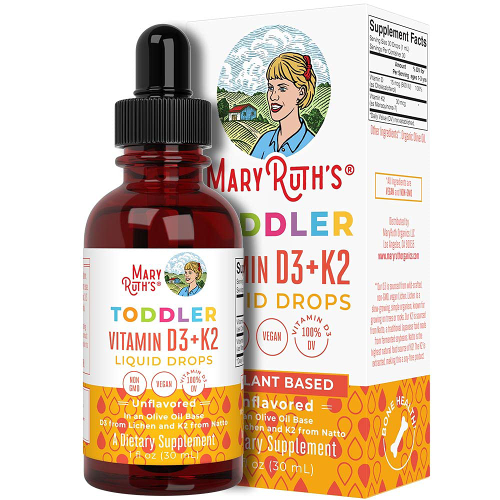Vitamin D is a critical nutrient for people of all ages, but it's particularly important for infants as they grow and develop. Understanding how much vitamin D is necessary for your infant can help prevent vitamin D deficiency, which can lead to health issues such as rickets and future chronic diseases. This article will delve into the recommended vitamin D intake for infants, the role of breast milk and formula in providing this essential nutrient, and the importance of supplements to ensure adequate levels.
The Importance of Vitamin D for Infants
Vitamin D plays a pivotal role in optimizing bone health and maintaining a robust immune system. For babies younger than 1 year, adequate vitamin D is essential for the absorption of calcium, which is necessary for building strong bones. Moreover, recent research suggests that vitamin D may also help in fighting infection and reducing the risk of developing autoimmune conditions like rheumatoid arthritis and multiple sclerosis later in life.
American Academy of Pediatrics Guidelines
The American Academy of Pediatrics (AAP) has set forth new guidelines recommending that all infants receive 400 IU of vitamin D per day, starting from the first few days after birth. This recommendation is made to ensure that infants have adequate vitamin D levels to support their rapid growth and development, particularly for those who are exclusively or partially breastfed.
Breast Milk and Vitamin D Content
While breast milk is the best source of nutrition for most children, it may not contain enough vitamin D to meet the daily requirements of an infant. This is why the AAP suggests vitamin D supplementation for breastfed babies and partially breastfed infants, to ensure they receive enough of this nutrient.
Formula-fed Babies and Vitamin D
Infant formula is fortified with vitamin D, but formula-fed babies may still require additional supplementation to reach the recommended 400 IU per day. Parents should check the amount of vitamin D in their baby's formula and consult with a pediatrician to determine if additional supplementation is necessary.
Vitamin D Supplementation for Infants
For infants who need more vitamin D, liquid supplements are available and are designed specifically for young infants. These liquid-form supplements are easy to administer and ensure that babies receive the correct dosage of vitamin D necessary for their health.
Sun Exposure and Vitamin D
While sun exposure can help older children and adults synthesize vitamin D naturally, direct sunlight is not recommended for babies younger than 6 months due to the risk of skin damage and skin cancer. Therefore, supplementation is the safest way to ensure adequate vitamin D intake for infants.
Vitamin D Sources for Infants Beyond Supplements
When considering how much vitamin D for infants is necessary, it's not just about supplements. Nature has packed vitamin D into various foods that can be introduced as your baby grows. Fatty fish like salmon and mackerel are excellent sources, but they're more suitable for older infants who can handle solids. For younger babies, vitamin D-fortified formula is a fantastic alternative, ensuring they get their daily dose without the need for additional vitamin supplements.
However, it's not just about what the infant consumes directly. Pregnant women need to maintain adequate vitamin D levels as it impacts the reserves in their newborns. Including fortified milk and orange juice in the diet can help. These fortified options are a great way to ensure both mother and baby are getting enough of this essential nutrient, which is crucial for the development and maintenance of healthy bones.
Vitamin D and Immune System Support in Infants
Have you ever wondered about the connection between vitamin D and your little one's immune system? It's quite fascinating! Vitamin D isn't just crucial for bone health; it plays a significant role in supporting the immune system. Infants with adequate vitamin D levels tend to have better protection against certain infections and diseases. This is because vitamin D receptors are found on immune cells, and the vitamin can modulate innate and adaptive immune responses.
Now, while breast milk is the best source of nutrition for infants, it may not always provide enough vitamin D to meet all their needs. That's where vitamin D supplements come into play. A daily supplement can help ensure that your baby has the necessary support for a developing immune system. It's like giving your infant's immune system a little extra armor against the germs of the outside world. Just be sure to consult with your pediatrician to determine the right amount for your baby.
The Relationship Between Vitamin D and Infant Sleep Patterns
Let's talk about sleep – not yours, but your baby's! Did you know that vitamin D has been linked to sleep patterns in infants? It's true! Research suggests that vitamin D plays a role in regulating sleep. Adequate levels of this sunshine vitamin could be associated with better sleep quality and duration in infants. This is particularly important because sleep is when a lot of growth and development happens for your little one.
But how do you ensure your infant is getting enough vitamin D to potentially benefit their sleep? Aside from the natural synthesis from sunlight, a daily supplement of vitamin D can be a reliable method to maintain adequate levels in your baby's body. Of course, it's essential to follow the guidance of a healthcare professional when it comes to supplementation. By doing so, you're not just supporting their bones and immune system, but you might also be contributing to a more restful night for both you and your baby.
The Role of Vitamin D in Developmental Milestones
Vitamin D plays a pivotal role in the early years of life, particularly in the development of strong and healthy bones. This is why ensuring enough calcium and vitamin D intake is critical for infants and toddlers. Most kids will start to build bones at a rapid pace, and without sufficient vitamin D, there's an increased risk of bone-related issues. The medical director of pediatric clinics often emphasizes the importance of maintaining adequate levels of vitamin D during these formative years of age.
An associate professor in pediatric nutrition might point out that while daily supplements are beneficial, they should be given in the right amounts. International units (IU) are the standard measurement for vitamin D, and while higher doses may be necessary for some children with a risk of vitamin, it's essential to consult with a healthcare provider to avoid toxicity. Regular monitoring and adjusting the dosage as the child grows is key to supporting their developmental milestones.
Recognizing Vitamin D Deficiency
Vitamin D deficiency can cause rickets, characterized by weak bones. Symptoms may include delayed growth, bone pain, and muscle weakness. Severe cases of deficiency can have serious long-term effects on bone health.
Risk Factors for Vitamin D Deficiency
Several risk factors can contribute to vitamin D deficiency in infants, including being exclusively breastfed without supplementation, having darker skin, living in areas with limited sunlight, and having mothers who are deficient in vitamin D during pregnancy.
Safe Vitamin D Supplementation
When choosing a vitamin D supplement for your infant, it's important to select one that is specifically designed for babies and to follow the dosing instructions carefully. High doses of vitamin D can be toxic, so it's crucial to stick to the recommended 400 IU per day unless advised otherwise by a healthcare professional.
Introducing Solid Foods and Vitamin D
As infants start to consume solid foods, parents can introduce vitamin D-fortified foods such as fortified cereals and egg yolks. However, until a baby's diet includes enough of these foods to meet the daily vitamin D requirement, supplementation should continue.
Monitoring Your Infant's Vitamin D Status
Regular check-ups with a pediatrician will include monitoring your infant's vitamin D status, especially if there are risk factors for deficiency. Blood tests can determine if an infant is getting enough vitamin D and whether adjustments to their diet or supplementation are needed.
The Role of Vitamin D in Long-Term Health
Adequate vitamin D intake in infancy sets the foundation for long-term health, including heart health and the prevention of chronic diseases. Ensuring that your infant receives enough vitamin D is an investment in their future well-being.


Can I give my infant too much vitamin D?
Yes, it's possible to give an infant too much vitamin D, which can be harmful. Stick to the recommended 400 IU per day unless a healthcare professional advises otherwise.
How do I know if my infant is getting enough vitamin D?
Regular check-ups with a pediatrician will help monitor your infant's vitamin D levels. If you're concerned about deficiency or are at risk, a blood test can provide accurate information on your infant's vitamin D status.
When can my infant get vitamin D from sunlight?
Infants under 6 months should avoid direct sunlight due to the risk of skin damage. Older infants and children can receive some vitamin D through sun exposure, but it should be limited and sunscreen use is recommended to prevent skin damage.

Vitamin D is essential for infants to develop strong bones and a healthy immune system. The American Academy of Pediatrics recommends 400 IU of vitamin D daily for infants, whether they are breastfed or formula-fed. Breast milk may not provide enough vitamin D, making supplementation necessary. Formula-fed babies may also need additional vitamin D, depending on the amount present in their formula. Sun exposure is not a safe option for infants under 6 months, so liquid supplements are the best method to ensure adequate vitamin D intake. Monitoring and adjusting vitamin D supplementation with the guidance of a pediatrician is crucial for the health and development of your infant.













